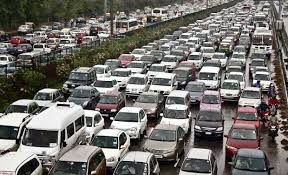congested
英 [kənˈdʒes.tɪd]
美 [kənˈdʒes.tɪd]
- adj. 堵塞的,拥挤的
- v. 挤满;超负荷(congest的过去分词)
使用频率:

记忆方法
将“congested”分解为“con-”和“gested”。想象“con-”有使动的意味,像是“集中”或“拥挤”,而“gested”源自“gest”,联想到“聚集”。所以,“congested”可以记忆为“集中/拥挤的聚集”,表示堵塞或拥挤的状态。
以上内容由AI生成, 仅供参考和借鉴
中文词源
congested 拥挤的
con-, 强调。-gest, 携带,词源同gesture, belligerent, aggestus(拉丁词,积聚). 即带到一起的。
英语词源
- congested (adj.)
- 1570s, "heaped up," past participle adjective from congest. Meaning "overcrowded" is recorded from 1862.
权威例句
- 1. He first promised two weeks ago to clear Britain's congested roads.
- 他在两周前首次承诺解决英国道路拥堵的问题。
- 2. The arteries in his neck had become fatally congested.
- 他颈动脉栓塞,危在旦夕。
- 3. Many of Europe's airports are heavily congested.
- 欧洲许多机场都十分拥挤。
- 4. Wangfujing Street is always very congested.
- 王府井大街总是非常拥挤.
- 5. The city streets were congested with vehicles.
- 市内的街道车辆拥挤.